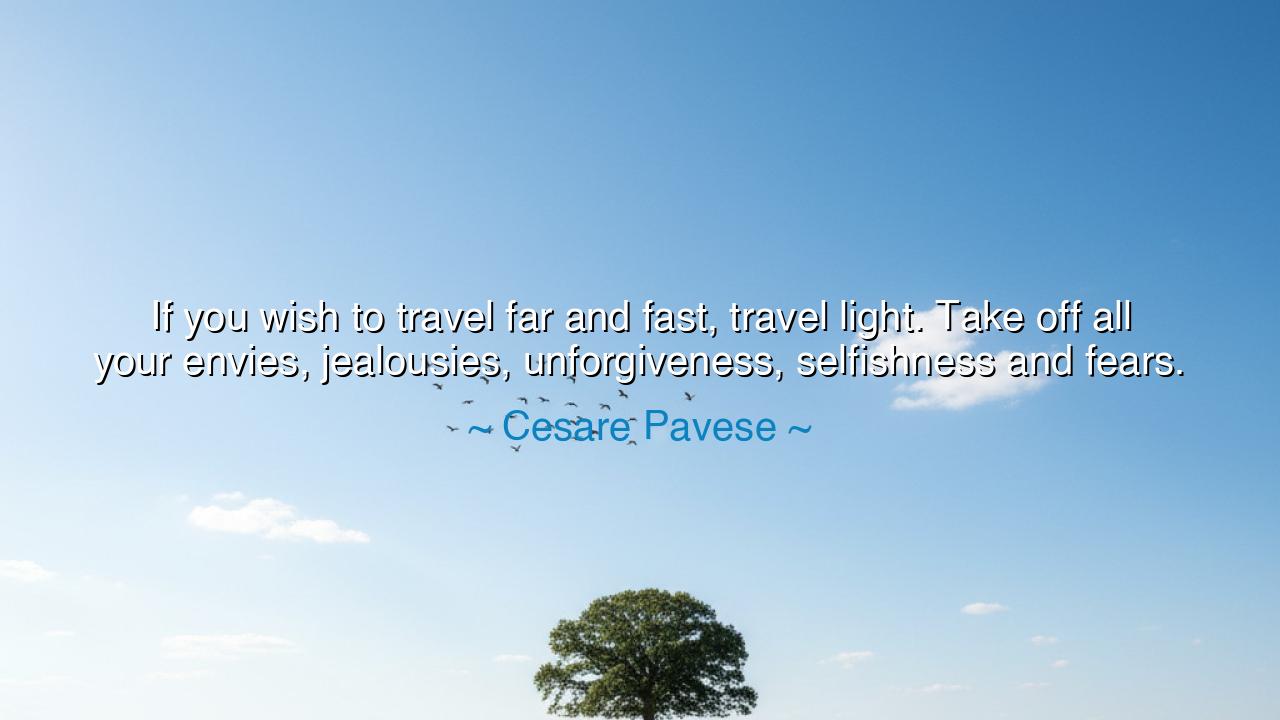
If you wish to travel far and fast, travel light. Take off all
If you wish to travel far and fast, travel light. Take off all your envies, jealousies, unforgiveness, selfishness and fears.






Hear, O pilgrims upon the road of life, the wisdom of Cesare Pavese, who declared: “If you wish to travel far and fast, travel light. Take off all your envies, jealousies, unforgiveness, selfishness and fears.” At first glance, these words may seem like counsel for the wanderer setting out upon the open road. Yet their meaning runs deeper, for Pavese speaks not only of the baggage of the body, but of the greater burdens of the soul. To carry resentment and envy is to weigh down the spirit; to cling to fear and selfishness is to stumble before ever beginning the journey.
The ancients long understood that freedom is not merely a matter of distance but of heart. The Stoics taught that the one who is enslaved by anger or desire is never free, even if he roams the world. Pavese echoes this wisdom: a man may possess wings upon his feet, yet if his spirit drags chains of envy, he cannot soar. To travel light is to unshackle oneself from these inner weights, to shed all that clings and corrodes, so that the soul may move swiftly toward its destiny.
Consider the tale of Siddhartha Gautama, who became the Buddha. He walked away from his palace not only leaving behind gold and finery, but also casting aside the burdens of pride, of selfish longing, of attachment to illusions. By traveling light, he reached farther than any caravan could carry him—into enlightenment itself. His journey was not one of speed, but of depth, and it was possible only because he laid down the heavy stones of the heart.
Pavese also speaks to the truth of companionship. One who carries jealousy cannot rejoice in the victories of others; one who carries unforgiveness poisons even the sweetest bond. Such a traveler is forever hindered, for his feet move forward, but his soul is chained backward. The one who travels light, however, brings joy to companions and receives joy in return, for he carries only what nourishes and never what corrodes. In this way, he covers more ground not only in miles, but in friendship and meaning.
This wisdom is not confined to saints and sages, but is written in history itself. When Nelson Mandela walked free after twenty-seven years in prison, he declared that to hold on to bitterness would be to remain imprisoned still. By casting aside unforgiveness and fear, he traveled light into the new world of reconciliation, leading his nation farther and faster than vengeance ever could. In him, Pavese’s words come alive, shining as a reminder that the greatest journeys are not measured in steps, but in liberation of spirit.
The lesson for us is clear: before setting out on any path—whether across seas or simply into tomorrow—lay down the heavy weights you need not carry. Ask yourself: what envies burden me, what fears hold me back, what grudges chain me to yesterday? Cast them off, as a traveler casts aside needless baggage, and you will find yourself lighter, freer, swifter. For distance is not conquered by speed alone, but by the unburdened heart.
Practically, this means practicing forgiveness even when it is hard, choosing gratitude over jealousy, cultivating generosity over selfishness, and facing fear with courage. Begin each day by naming the weights you refuse to carry, and choose instead to walk in freedom. In doing so, you will not only travel farther—you will travel in peace.
So let these words be carried like a lantern for all generations: To travel far and fast, travel light. Cast off the burdens that do not belong to you, and walk with the strength of a soul unchained. For the road belongs not to the heaviest, but to the lightest, and the crown of life rests upon those who walk free.






AAdministratorAdministrator
Welcome, honored guests. Please leave a comment, we will respond soon